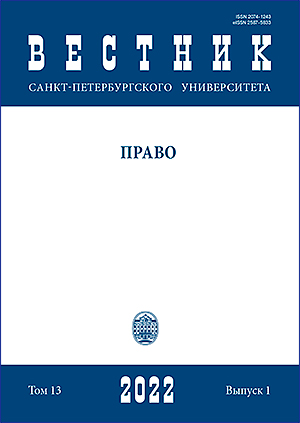Criminal law regulation of criminal acts involving COVID-19 epidemic
DOI:
https://doi.org/10.21638/spbu14.2022.110Аннотация
On the eve of the 2020 Spring Festival, the new coronavirus pneumonia broke out, normal social order was affected, and crimes involving the epidemic increased. On February 6, 2020, the Supreme People’s Court, the Supreme People’s Procuratorate, the Ministry of Public Security, and the Ministry of Justice jointly issued “Opinions on Punishment of Crimes Obstructing the Prevention and Control of the Novel Coronavirus Infection Pneumonia Epidemic According to Law”, which clearly stipulates nine types of crimes that hinder the prevention and control of the epidemic. In order to clarify and solve some outstanding problems of inconsistent understanding of the application of laws in the practice of epidemic prevention and control, the Supreme People’s Procuratorate selected cases that accounted for a large portion of cases, reflected many problems, and urgently required practical practices; they then issued ten batches of “Typical Cases of Crimes Obstructing the Prevention and Control of the New Coronary Pneumonia Epidemic by Procuratorial Organs across the Country”. This article is mainly based on the “Prosecutors across the country handle typical cases of crimes obstructing the prevention and control of the new crown pneumonia epidemic in accordance with the law”, analyzing economic and property crimes, crimes that disrupt the order of social management, and crimes that endanger public safety.
Ключевые слова:
COVID-19 pandemic, crimes involving epidemic situation, judicial cognizance, criminal policy, infectious diseases, judicial practice, disputed issue, coping path
Скачивания
Библиографические ссылки
Загрузки
Опубликован
Как цитировать
Выпуск
Раздел
Лицензия
Статьи журнала «Вестник Санкт-Петербургского университета. Право» находятся в открытом доступе и распространяются в соответствии с условиями Лицензионного Договора с Санкт-Петербургским государственным университетом, который бесплатно предоставляет авторам неограниченное распространение и самостоятельное архивирование.






